Contract Law Analysis: Invitations to Treat, Offers, and Consideration
VerifiedAdded on 2019/10/12
|8
|1881
|494
Homework Assignment
AI Summary
This assignment delves into the core principles of contract law, examining key concepts such as invitations to treat, offers, acceptance, and consideration through the analysis of provided case studies. The first section focuses on a scenario involving an advertisement, evaluating whether it constitutes an offer or an invitation to treat, and assessing the obligations of the parties involved. The second section analyzes a cafe scenario, examining the formation of contracts and the impact of misinterpretations on agreements. The assignment concludes with a detailed explanation of consideration, outlining its characteristics, various forms (executory and executed), and associated restrictions. The document references relevant legal literature to support its arguments, offering a comprehensive overview of contract law principles.

Running head: BASIC PRINCIPLES OF CONTRACT LAW
contract law
[Document subtitle]
contract law
[Document subtitle]
Paraphrase This Document
Need a fresh take? Get an instant paraphrase of this document with our AI Paraphraser
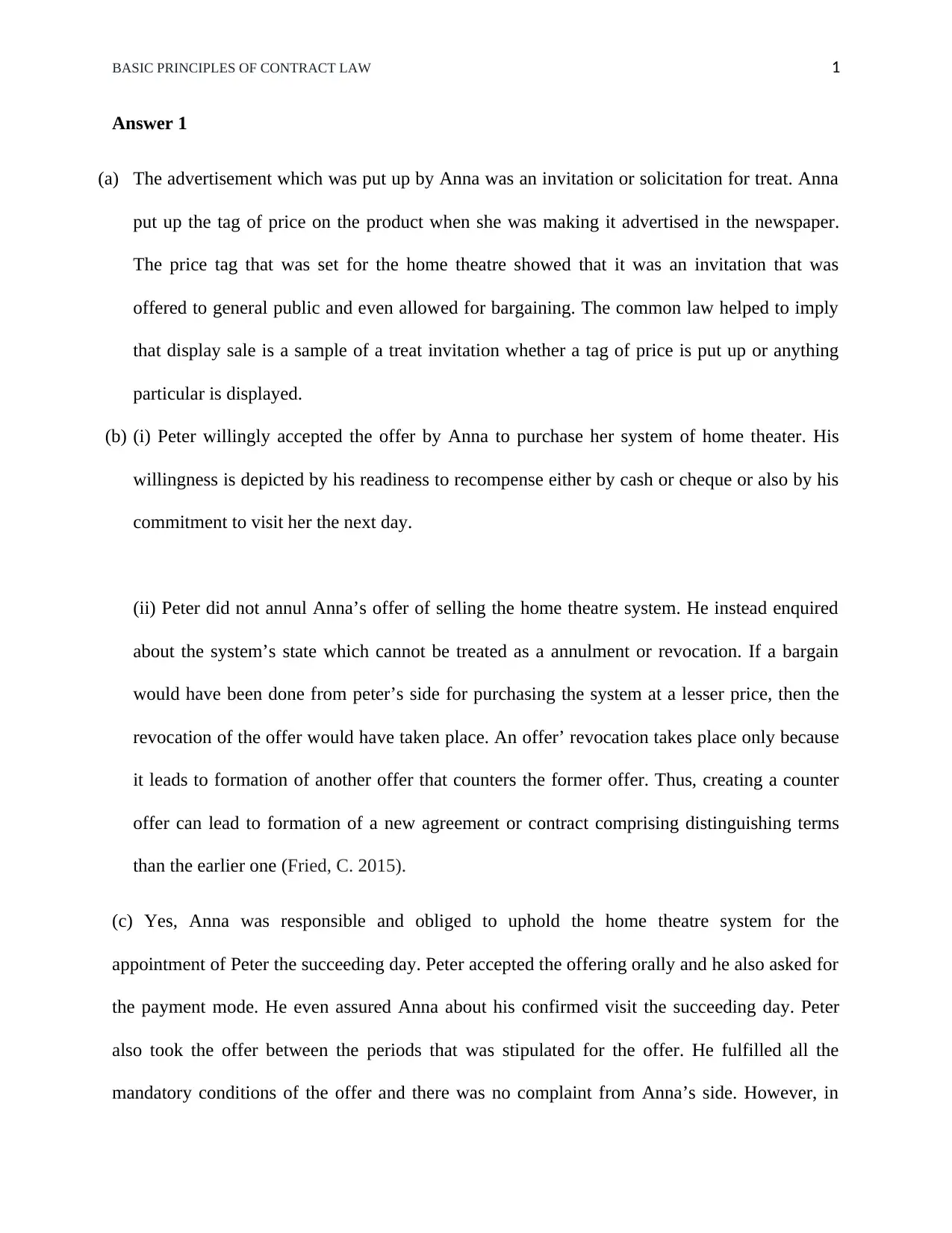
BASIC PRINCIPLES OF CONTRACT LAW 1
Answer 1
(a) The advertisement which was put up by Anna was an invitation or solicitation for treat. Anna
put up the tag of price on the product when she was making it advertised in the newspaper.
The price tag that was set for the home theatre showed that it was an invitation that was
offered to general public and even allowed for bargaining. The common law helped to imply
that display sale is a sample of a treat invitation whether a tag of price is put up or anything
particular is displayed.
(b) (i) Peter willingly accepted the offer by Anna to purchase her system of home theater. His
willingness is depicted by his readiness to recompense either by cash or cheque or also by his
commitment to visit her the next day.
(ii) Peter did not annul Anna’s offer of selling the home theatre system. He instead enquired
about the system’s state which cannot be treated as a annulment or revocation. If a bargain
would have been done from peter’s side for purchasing the system at a lesser price, then the
revocation of the offer would have taken place. An offer’ revocation takes place only because
it leads to formation of another offer that counters the former offer. Thus, creating a counter
offer can lead to formation of a new agreement or contract comprising distinguishing terms
than the earlier one (Fried, C. 2015).
(c) Yes, Anna was responsible and obliged to uphold the home theatre system for the
appointment of Peter the succeeding day. Peter accepted the offering orally and he also asked for
the payment mode. He even assured Anna about his confirmed visit the succeeding day. Peter
also took the offer between the periods that was stipulated for the offer. He fulfilled all the
mandatory conditions of the offer and there was no complaint from Anna’s side. However, in
Answer 1
(a) The advertisement which was put up by Anna was an invitation or solicitation for treat. Anna
put up the tag of price on the product when she was making it advertised in the newspaper.
The price tag that was set for the home theatre showed that it was an invitation that was
offered to general public and even allowed for bargaining. The common law helped to imply
that display sale is a sample of a treat invitation whether a tag of price is put up or anything
particular is displayed.
(b) (i) Peter willingly accepted the offer by Anna to purchase her system of home theater. His
willingness is depicted by his readiness to recompense either by cash or cheque or also by his
commitment to visit her the next day.
(ii) Peter did not annul Anna’s offer of selling the home theatre system. He instead enquired
about the system’s state which cannot be treated as a annulment or revocation. If a bargain
would have been done from peter’s side for purchasing the system at a lesser price, then the
revocation of the offer would have taken place. An offer’ revocation takes place only because
it leads to formation of another offer that counters the former offer. Thus, creating a counter
offer can lead to formation of a new agreement or contract comprising distinguishing terms
than the earlier one (Fried, C. 2015).
(c) Yes, Anna was responsible and obliged to uphold the home theatre system for the
appointment of Peter the succeeding day. Peter accepted the offering orally and he also asked for
the payment mode. He even assured Anna about his confirmed visit the succeeding day. Peter
also took the offer between the periods that was stipulated for the offer. He fulfilled all the
mandatory conditions of the offer and there was no complaint from Anna’s side. However, in
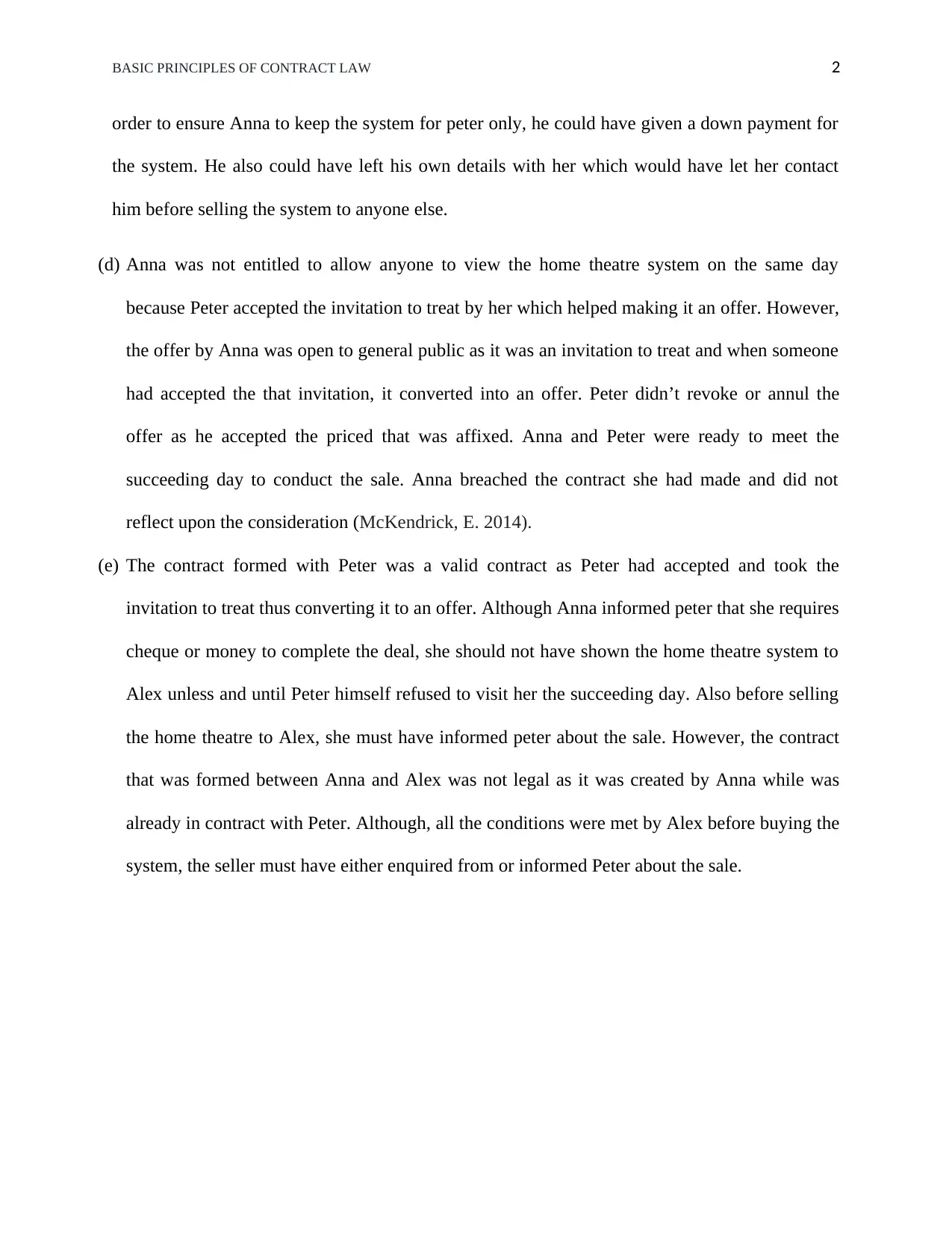
BASIC PRINCIPLES OF CONTRACT LAW 2
order to ensure Anna to keep the system for peter only, he could have given a down payment for
the system. He also could have left his own details with her which would have let her contact
him before selling the system to anyone else.
(d) Anna was not entitled to allow anyone to view the home theatre system on the same day
because Peter accepted the invitation to treat by her which helped making it an offer. However,
the offer by Anna was open to general public as it was an invitation to treat and when someone
had accepted the that invitation, it converted into an offer. Peter didn’t revoke or annul the
offer as he accepted the priced that was affixed. Anna and Peter were ready to meet the
succeeding day to conduct the sale. Anna breached the contract she had made and did not
reflect upon the consideration (McKendrick, E. 2014).
(e) The contract formed with Peter was a valid contract as Peter had accepted and took the
invitation to treat thus converting it to an offer. Although Anna informed peter that she requires
cheque or money to complete the deal, she should not have shown the home theatre system to
Alex unless and until Peter himself refused to visit her the succeeding day. Also before selling
the home theatre to Alex, she must have informed peter about the sale. However, the contract
that was formed between Anna and Alex was not legal as it was created by Anna while was
already in contract with Peter. Although, all the conditions were met by Alex before buying the
system, the seller must have either enquired from or informed Peter about the sale.
order to ensure Anna to keep the system for peter only, he could have given a down payment for
the system. He also could have left his own details with her which would have let her contact
him before selling the system to anyone else.
(d) Anna was not entitled to allow anyone to view the home theatre system on the same day
because Peter accepted the invitation to treat by her which helped making it an offer. However,
the offer by Anna was open to general public as it was an invitation to treat and when someone
had accepted the that invitation, it converted into an offer. Peter didn’t revoke or annul the
offer as he accepted the priced that was affixed. Anna and Peter were ready to meet the
succeeding day to conduct the sale. Anna breached the contract she had made and did not
reflect upon the consideration (McKendrick, E. 2014).
(e) The contract formed with Peter was a valid contract as Peter had accepted and took the
invitation to treat thus converting it to an offer. Although Anna informed peter that she requires
cheque or money to complete the deal, she should not have shown the home theatre system to
Alex unless and until Peter himself refused to visit her the succeeding day. Also before selling
the home theatre to Alex, she must have informed peter about the sale. However, the contract
that was formed between Anna and Alex was not legal as it was created by Anna while was
already in contract with Peter. Although, all the conditions were met by Alex before buying the
system, the seller must have either enquired from or informed Peter about the sale.
⊘ This is a preview!⊘
Do you want full access?
Subscribe today to unlock all pages.

Trusted by 1+ million students worldwide
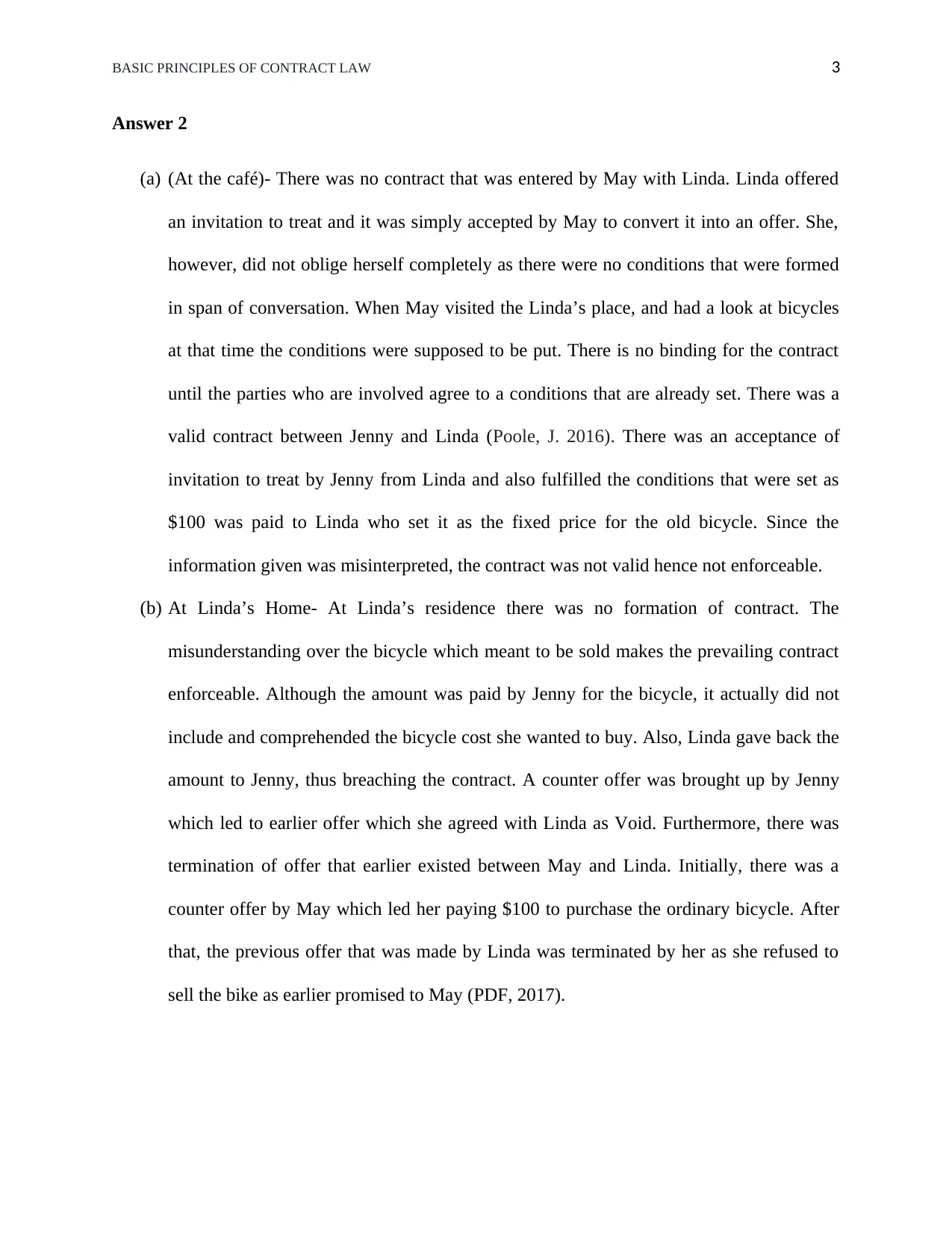
BASIC PRINCIPLES OF CONTRACT LAW 3
Answer 2
(a) (At the café)- There was no contract that was entered by May with Linda. Linda offered
an invitation to treat and it was simply accepted by May to convert it into an offer. She,
however, did not oblige herself completely as there were no conditions that were formed
in span of conversation. When May visited the Linda’s place, and had a look at bicycles
at that time the conditions were supposed to be put. There is no binding for the contract
until the parties who are involved agree to a conditions that are already set. There was a
valid contract between Jenny and Linda (Poole, J. 2016). There was an acceptance of
invitation to treat by Jenny from Linda and also fulfilled the conditions that were set as
$100 was paid to Linda who set it as the fixed price for the old bicycle. Since the
information given was misinterpreted, the contract was not valid hence not enforceable.
(b) At Linda’s Home- At Linda’s residence there was no formation of contract. The
misunderstanding over the bicycle which meant to be sold makes the prevailing contract
enforceable. Although the amount was paid by Jenny for the bicycle, it actually did not
include and comprehended the bicycle cost she wanted to buy. Also, Linda gave back the
amount to Jenny, thus breaching the contract. A counter offer was brought up by Jenny
which led to earlier offer which she agreed with Linda as Void. Furthermore, there was
termination of offer that earlier existed between May and Linda. Initially, there was a
counter offer by May which led her paying $100 to purchase the ordinary bicycle. After
that, the previous offer that was made by Linda was terminated by her as she refused to
sell the bike as earlier promised to May (PDF, 2017).
Answer 2
(a) (At the café)- There was no contract that was entered by May with Linda. Linda offered
an invitation to treat and it was simply accepted by May to convert it into an offer. She,
however, did not oblige herself completely as there were no conditions that were formed
in span of conversation. When May visited the Linda’s place, and had a look at bicycles
at that time the conditions were supposed to be put. There is no binding for the contract
until the parties who are involved agree to a conditions that are already set. There was a
valid contract between Jenny and Linda (Poole, J. 2016). There was an acceptance of
invitation to treat by Jenny from Linda and also fulfilled the conditions that were set as
$100 was paid to Linda who set it as the fixed price for the old bicycle. Since the
information given was misinterpreted, the contract was not valid hence not enforceable.
(b) At Linda’s Home- At Linda’s residence there was no formation of contract. The
misunderstanding over the bicycle which meant to be sold makes the prevailing contract
enforceable. Although the amount was paid by Jenny for the bicycle, it actually did not
include and comprehended the bicycle cost she wanted to buy. Also, Linda gave back the
amount to Jenny, thus breaching the contract. A counter offer was brought up by Jenny
which led to earlier offer which she agreed with Linda as Void. Furthermore, there was
termination of offer that earlier existed between May and Linda. Initially, there was a
counter offer by May which led her paying $100 to purchase the ordinary bicycle. After
that, the previous offer that was made by Linda was terminated by her as she refused to
sell the bike as earlier promised to May (PDF, 2017).
Paraphrase This Document
Need a fresh take? Get an instant paraphrase of this document with our AI Paraphraser
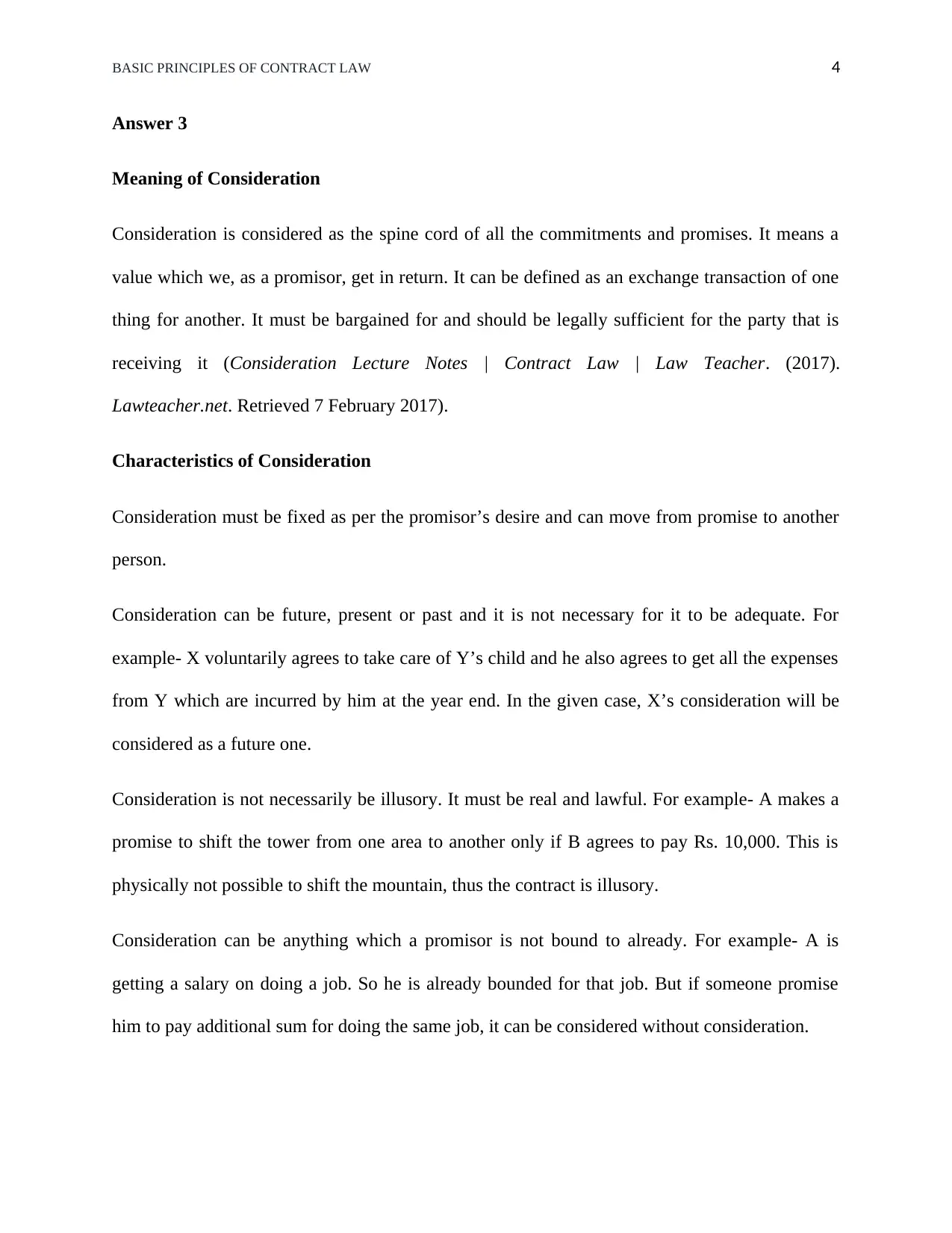
BASIC PRINCIPLES OF CONTRACT LAW 4
Answer 3
Meaning of Consideration
Consideration is considered as the spine cord of all the commitments and promises. It means a
value which we, as a promisor, get in return. It can be defined as an exchange transaction of one
thing for another. It must be bargained for and should be legally sufficient for the party that is
receiving it (Consideration Lecture Notes | Contract Law | Law Teacher. (2017).
Lawteacher.net. Retrieved 7 February 2017).
Characteristics of Consideration
Consideration must be fixed as per the promisor’s desire and can move from promise to another
person.
Consideration can be future, present or past and it is not necessary for it to be adequate. For
example- X voluntarily agrees to take care of Y’s child and he also agrees to get all the expenses
from Y which are incurred by him at the year end. In the given case, X’s consideration will be
considered as a future one.
Consideration is not necessarily be illusory. It must be real and lawful. For example- A makes a
promise to shift the tower from one area to another only if B agrees to pay Rs. 10,000. This is
physically not possible to shift the mountain, thus the contract is illusory.
Consideration can be anything which a promisor is not bound to already. For example- A is
getting a salary on doing a job. So he is already bounded for that job. But if someone promise
him to pay additional sum for doing the same job, it can be considered without consideration.
Answer 3
Meaning of Consideration
Consideration is considered as the spine cord of all the commitments and promises. It means a
value which we, as a promisor, get in return. It can be defined as an exchange transaction of one
thing for another. It must be bargained for and should be legally sufficient for the party that is
receiving it (Consideration Lecture Notes | Contract Law | Law Teacher. (2017).
Lawteacher.net. Retrieved 7 February 2017).
Characteristics of Consideration
Consideration must be fixed as per the promisor’s desire and can move from promise to another
person.
Consideration can be future, present or past and it is not necessary for it to be adequate. For
example- X voluntarily agrees to take care of Y’s child and he also agrees to get all the expenses
from Y which are incurred by him at the year end. In the given case, X’s consideration will be
considered as a future one.
Consideration is not necessarily be illusory. It must be real and lawful. For example- A makes a
promise to shift the tower from one area to another only if B agrees to pay Rs. 10,000. This is
physically not possible to shift the mountain, thus the contract is illusory.
Consideration can be anything which a promisor is not bound to already. For example- A is
getting a salary on doing a job. So he is already bounded for that job. But if someone promise
him to pay additional sum for doing the same job, it can be considered without consideration.
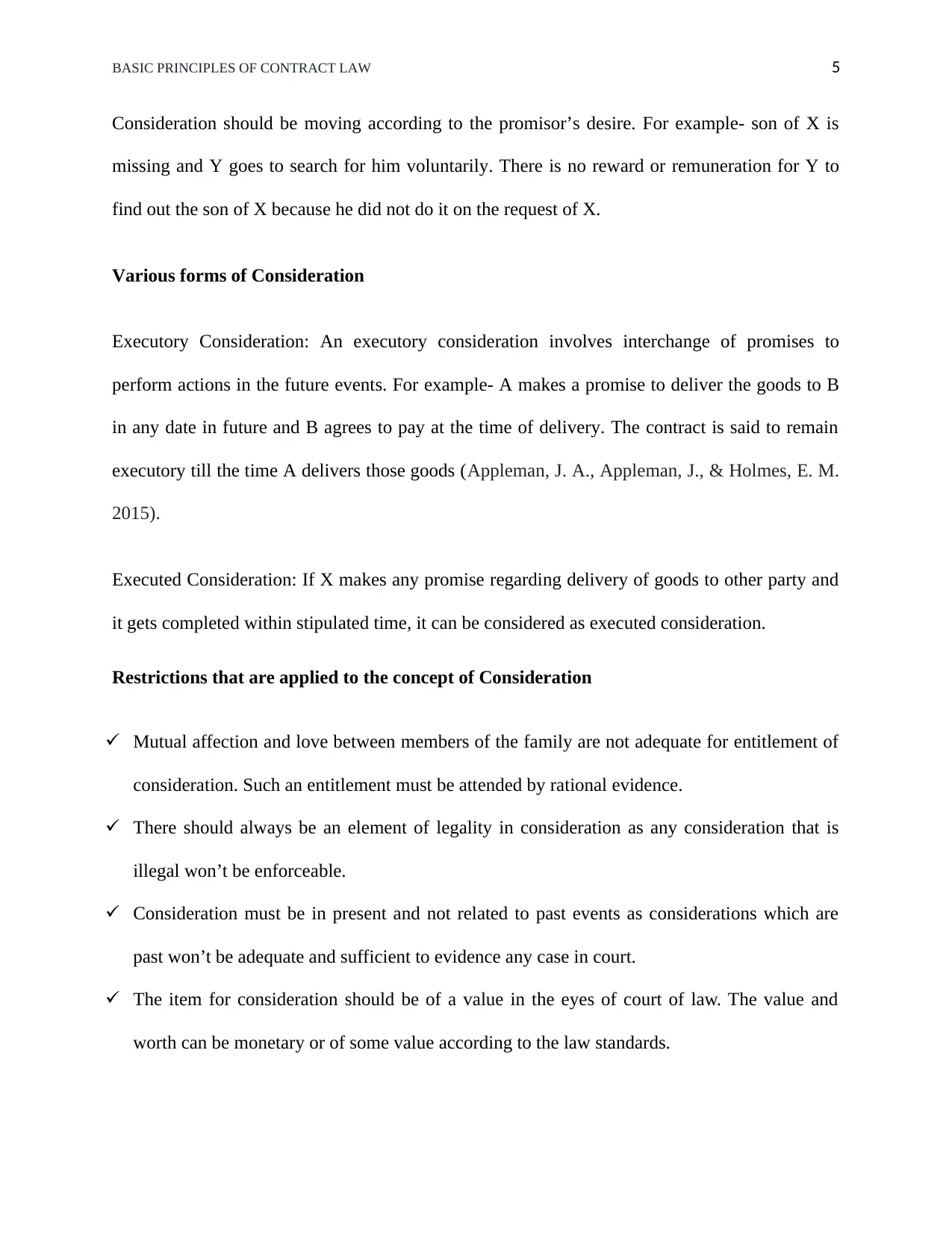
BASIC PRINCIPLES OF CONTRACT LAW 5
Consideration should be moving according to the promisor’s desire. For example- son of X is
missing and Y goes to search for him voluntarily. There is no reward or remuneration for Y to
find out the son of X because he did not do it on the request of X.
Various forms of Consideration
Executory Consideration: An executory consideration involves interchange of promises to
perform actions in the future events. For example- A makes a promise to deliver the goods to B
in any date in future and B agrees to pay at the time of delivery. The contract is said to remain
executory till the time A delivers those goods (Appleman, J. A., Appleman, J., & Holmes, E. M.
2015).
Executed Consideration: If X makes any promise regarding delivery of goods to other party and
it gets completed within stipulated time, it can be considered as executed consideration.
Restrictions that are applied to the concept of Consideration
Mutual affection and love between members of the family are not adequate for entitlement of
consideration. Such an entitlement must be attended by rational evidence.
There should always be an element of legality in consideration as any consideration that is
illegal won’t be enforceable.
Consideration must be in present and not related to past events as considerations which are
past won’t be adequate and sufficient to evidence any case in court.
The item for consideration should be of a value in the eyes of court of law. The value and
worth can be monetary or of some value according to the law standards.
Consideration should be moving according to the promisor’s desire. For example- son of X is
missing and Y goes to search for him voluntarily. There is no reward or remuneration for Y to
find out the son of X because he did not do it on the request of X.
Various forms of Consideration
Executory Consideration: An executory consideration involves interchange of promises to
perform actions in the future events. For example- A makes a promise to deliver the goods to B
in any date in future and B agrees to pay at the time of delivery. The contract is said to remain
executory till the time A delivers those goods (Appleman, J. A., Appleman, J., & Holmes, E. M.
2015).
Executed Consideration: If X makes any promise regarding delivery of goods to other party and
it gets completed within stipulated time, it can be considered as executed consideration.
Restrictions that are applied to the concept of Consideration
Mutual affection and love between members of the family are not adequate for entitlement of
consideration. Such an entitlement must be attended by rational evidence.
There should always be an element of legality in consideration as any consideration that is
illegal won’t be enforceable.
Consideration must be in present and not related to past events as considerations which are
past won’t be adequate and sufficient to evidence any case in court.
The item for consideration should be of a value in the eyes of court of law. The value and
worth can be monetary or of some value according to the law standards.
⊘ This is a preview!⊘
Do you want full access?
Subscribe today to unlock all pages.

Trusted by 1+ million students worldwide
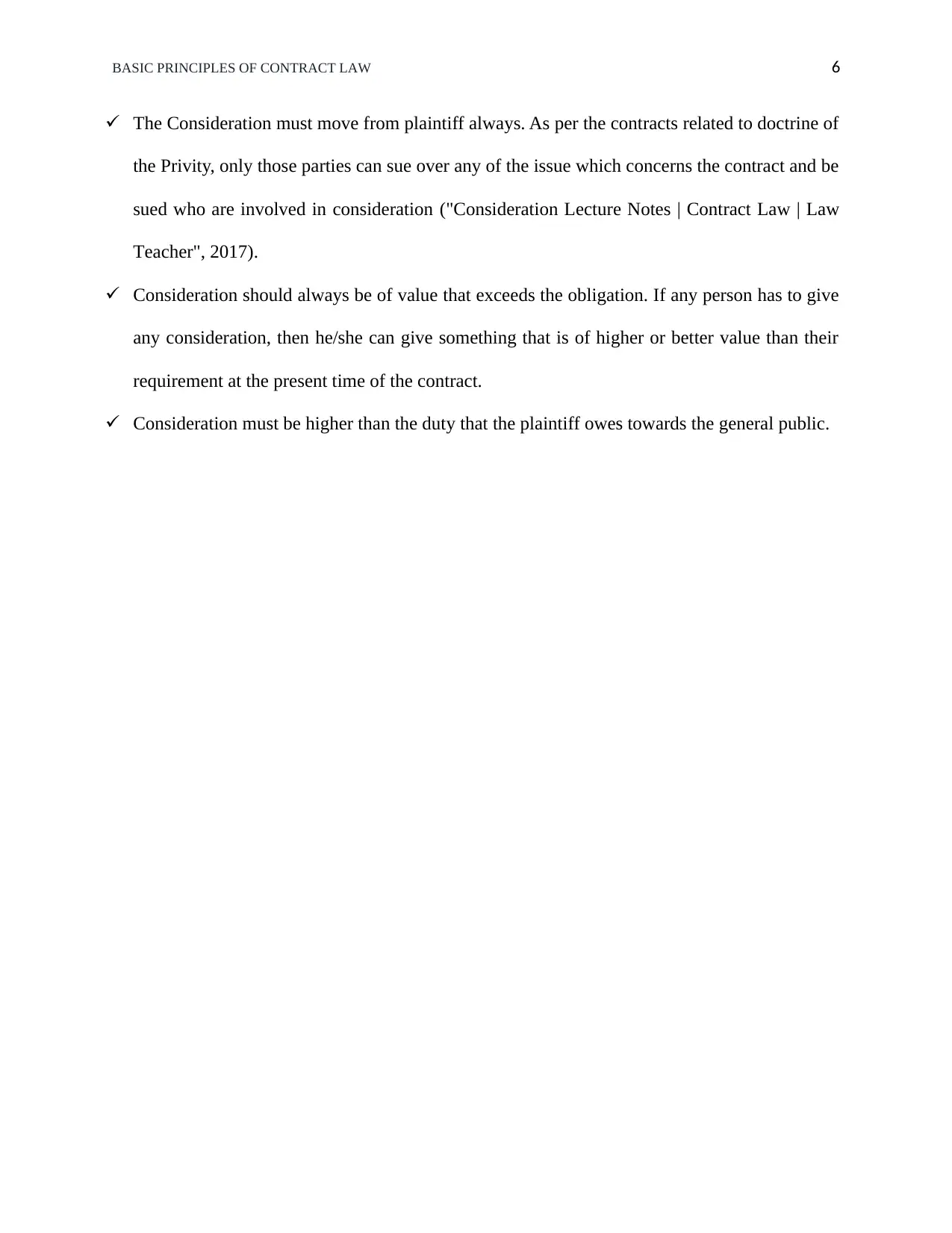
BASIC PRINCIPLES OF CONTRACT LAW 6
The Consideration must move from plaintiff always. As per the contracts related to doctrine of
the Privity, only those parties can sue over any of the issue which concerns the contract and be
sued who are involved in consideration ("Consideration Lecture Notes | Contract Law | Law
Teacher", 2017).
Consideration should always be of value that exceeds the obligation. If any person has to give
any consideration, then he/she can give something that is of higher or better value than their
requirement at the present time of the contract.
Consideration must be higher than the duty that the plaintiff owes towards the general public.
The Consideration must move from plaintiff always. As per the contracts related to doctrine of
the Privity, only those parties can sue over any of the issue which concerns the contract and be
sued who are involved in consideration ("Consideration Lecture Notes | Contract Law | Law
Teacher", 2017).
Consideration should always be of value that exceeds the obligation. If any person has to give
any consideration, then he/she can give something that is of higher or better value than their
requirement at the present time of the contract.
Consideration must be higher than the duty that the plaintiff owes towards the general public.
Paraphrase This Document
Need a fresh take? Get an instant paraphrase of this document with our AI Paraphraser
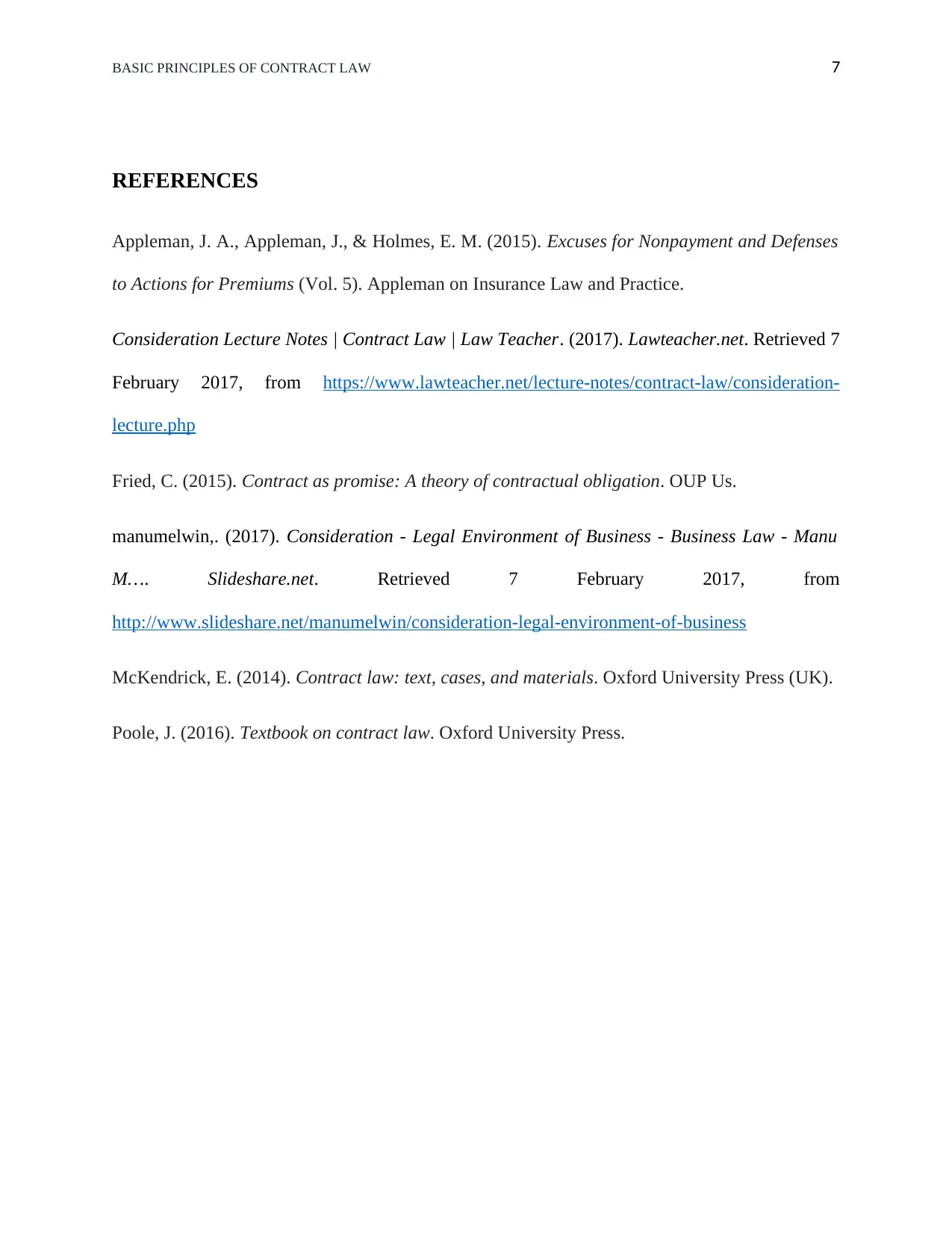
BASIC PRINCIPLES OF CONTRACT LAW 7
REFERENCES
Appleman, J. A., Appleman, J., & Holmes, E. M. (2015). Excuses for Nonpayment and Defenses
to Actions for Premiums (Vol. 5). Appleman on Insurance Law and Practice.
Consideration Lecture Notes | Contract Law | Law Teacher. (2017). Lawteacher.net. Retrieved 7
February 2017, from https://www.lawteacher.net/lecture-notes/contract-law/consideration-
lecture.php
Fried, C. (2015). Contract as promise: A theory of contractual obligation. OUP Us.
manumelwin,. (2017). Consideration - Legal Environment of Business - Business Law - Manu
M…. Slideshare.net. Retrieved 7 February 2017, from
http://www.slideshare.net/manumelwin/consideration-legal-environment-of-business
McKendrick, E. (2014). Contract law: text, cases, and materials. Oxford University Press (UK).
Poole, J. (2016). Textbook on contract law. Oxford University Press.
REFERENCES
Appleman, J. A., Appleman, J., & Holmes, E. M. (2015). Excuses for Nonpayment and Defenses
to Actions for Premiums (Vol. 5). Appleman on Insurance Law and Practice.
Consideration Lecture Notes | Contract Law | Law Teacher. (2017). Lawteacher.net. Retrieved 7
February 2017, from https://www.lawteacher.net/lecture-notes/contract-law/consideration-
lecture.php
Fried, C. (2015). Contract as promise: A theory of contractual obligation. OUP Us.
manumelwin,. (2017). Consideration - Legal Environment of Business - Business Law - Manu
M…. Slideshare.net. Retrieved 7 February 2017, from
http://www.slideshare.net/manumelwin/consideration-legal-environment-of-business
McKendrick, E. (2014). Contract law: text, cases, and materials. Oxford University Press (UK).
Poole, J. (2016). Textbook on contract law. Oxford University Press.
1 out of 8
Related Documents
Your All-in-One AI-Powered Toolkit for Academic Success.
+13062052269
info@desklib.com
Available 24*7 on WhatsApp / Email
![[object Object]](/_next/static/media/star-bottom.7253800d.svg)
Unlock your academic potential
Copyright © 2020–2025 A2Z Services. All Rights Reserved. Developed and managed by ZUCOL.



